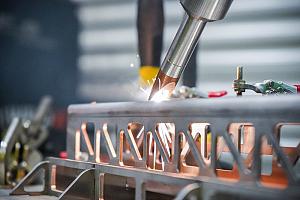Editor-in-Chief
- FMA
- The Fabricator
- FABTECH
- Canadian Metalworking
Categories
- Additive Manufacturing
- Aluminum Welding
- Arc Welding
- Assembly and Joining
- Automation and Robotics
- Bending and Forming
- Consumables
- Cutting and Weld Prep
- Electric Vehicles
- En Español
- Finishing
- Hydroforming
- Laser Cutting
- Laser Welding
- Machining
- Manufacturing Software
- Materials Handling
- Metals/Materials
- Oxyfuel Cutting
- Plasma Cutting
- Power Tools
- Punching and Other Holemaking
- Roll Forming
- Safety
- Sawing
- Shearing
- Shop Management
- Testing and Measuring
- Tube and Pipe Fabrication
- Tube and Pipe Production
- Waterjet Cutting
Industry Directory
Webcasts
Podcasts
FAB 40
Advertise
Subscribe
Account Login
Search
Putting retirement on hold in the manufacturing industry
Workers of retirement age who still want to work can prove to be valuable additions to a metal fabricator’s workforce
- By Dan Davis
- October 11, 2022

Metal fabricating companies need help to keep up with business. One of the best ways to maintain a strong workforce is to keep your more experienced workers around. Hopefully, retirement can wait for them. Goldfinch4ever/iStock/Getty Images Plus
Kenny Hicks, who provides a quality check on fabrication prints and is a training specialist for Able Steel Fabricators Inc., Mesa, Ariz., has spent 38 years working for his employer, and in 2018, he mentioned to them that he was considering retirement. Recognizing the amount of structural steel fabricating and welding expertise that might be walking out the door, Able Steel management asked Hicks to stick around and help develop a training program, with the assembly of a training manual being a part of that arrangement. (You can read more about how Hicks is helping to provide a solid training foundation for his company in an upcoming story in the December 2022 issue of The FABRICATOR.)
That same scenario is playing out at metal fabricating companies all over North America. It’s what Michael Corleone in “The Godfather III” says when he attempts to leave his old life behind, but things don’t quite work out like he anticipated: “Just when I thought I was out, they pull me back in.” Potential retirees are finding it hard to leave the job.
This trend also is playing out across the entire economy, not just manufacturing. A Rand Corp. report from 2019 found that 40% of workers 65 or older had previously retired at some point and rejoined the workforce. The Bureau of Labor Statistics estimates that 11 million workers are in the 65-and-older range, which is up from 10 million workers just last summer.
The motivations abound for this delay in retirement or re-entry into the workforce. Some people, frankly, need to keep working because Social Security and the saved retirement income aren’t there, especially during these times of higher inflation. Others genuinely miss the working environment, mixing it up with co-workers, and enjoying the sense of accomplishment from completing a project or helping a customer with a problem. Still others just like having extra spending money.
Those are all good news for manufacturing companies, who struggled to find people willing to work for them before the pandemic. Now that challenge is exacerbated even more as the rest of the private sector looks for entry-level labor to help get basic functions done.
That’s why employees like Hicks are so valuable. They know the processes, the material, and the challenges that await employees on the shop floor. At Able Steel, Hicks literally wrote the book on those things. His training manual will be the map to success for inexperienced hires for the foreseeable future.
Companies that have not been as proactive as Able Steel when it comes to extracting the institutional knowledge out of their experienced employees will need to be more accommodating to keep that expertise in-house. When you can’t replace them, retain them.
That could mean a part-time job, where the experienced worker can put in 20 hours per week instead of a full 40 hours. It also could mean flexibility where perhaps the experienced worker is able to work remotely or comes into the shop only when needed, such as during the summer when other employees take vacations or during busy periods when everyone is working overtime to keep pace with delivery dates. Thinking creatively about scheduling doesn’t only apply to young people.
There also might be some employees that simply want to step away. They’ve marked their calendars, enjoyed the cake and ice cream at the retirement party, and gracefully headed for the exit, either with a clear idea of what they want to do or with the plan to figure it out.
The catch is that can be pretty difficult for some people. Not everyone has a hobby they can get lost in. It’s also easy to miss the camaraderie that comes with being part of a team and working toward common goals. Golfing and fishing are fun, but is it as fun if you are doing it all the time?
That’s why the doors need to stay open for these experts. Whether they are looking for some sort of work arrangement that’s not full-time or they just need a sabbatical to enjoy some free time before engaging the manufacturing world again, experienced employees are worth making accommodations for.
“I know I bring value in what I do for the company,” Hicks said. That’s a statement backed up by almost 40 years of experience and knowledge. Why not put that to use as long as you can?
subscribe now

The Fabricator is North America's leading magazine for the metal forming and fabricating industry. The magazine delivers the news, technical articles, and case histories that enable fabricators to do their jobs more efficiently. The Fabricator has served the industry since 1970.
start your free subscriptionAbout the Author

Dan Davis
2135 Point Blvd.
Elgin, IL 60123
815-227-8281
Dan Davis is editor-in-chief of The Fabricator, the industry's most widely circulated metal fabricating magazine, and its sister publications, The Tube & Pipe Journal and The Welder. He has been with the publications since April 2002.
- Stay connected from anywhere

Easily access valuable industry resources now with full access to the digital edition of The Fabricator.

Easily access valuable industry resources now with full access to the digital edition of The Welder.

Easily access valuable industry resources now with full access to the digital edition of The Tube and Pipe Journal.
- Podcasting
- Podcast:
- The Fabricator Podcast
- Published:
- 04/30/2024
- Running Time:
- 53:00
Seth Feldman of Iowa-based Wertzbaugher Services joins The Fabricator Podcast to offer his take as a Gen Zer...
- Industry Events
Pipe and Tube Conference
- May 21 - 22, 2024
- Omaha, NE
World-Class Roll Forming Workshop
- June 5 - 6, 2024
- Louisville, KY
Advanced Laser Application Workshop
- June 25 - 27, 2024
- Novi, MI
Precision Press Brake Certificate Course
- July 31 - August 1, 2024
- Elgin,































